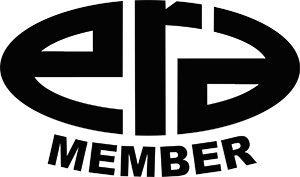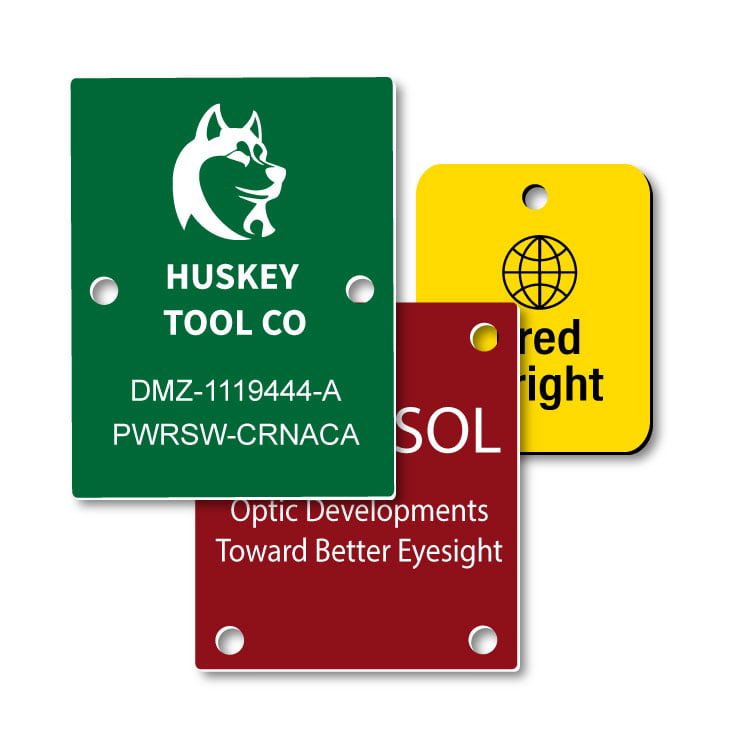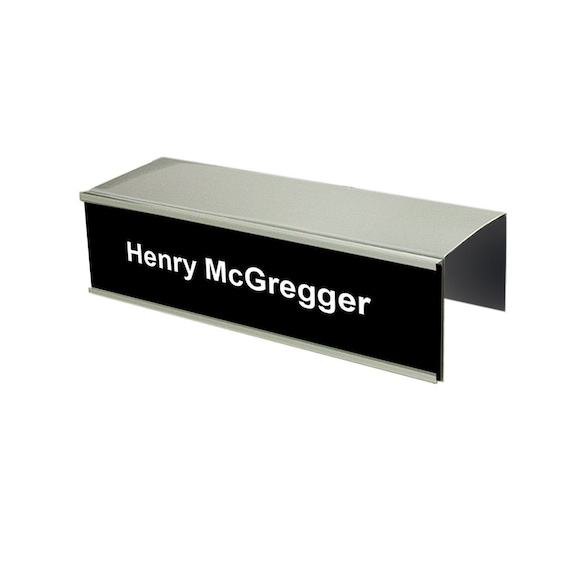Just How Plastic Nameplates Are Manufactured: A Comprehensive Guide to Their Manufacturing Refine
The production of plastic nameplates involves numerous precise steps, beginning from the selection of suitable products to the last finishing touches. Each stage is important, guaranteeing the product fulfills certain needs for sturdiness and appearances. Numerous manufacturing strategies play a significant duty in crafting these nameplates. Understanding these procedures can drop light on the complexities behind what might look like a straightforward product. What variables add to the top quality and customization of these nameplates?
Comprehending Plastic Products Used for Nameplates

The Layout Process: From Idea to Prototype
The style process for plastic nameplates begins with a clear idea that guides the total production. Designers work together with clients to define the purpose, style, and certain requirements of the nameplate. This preliminary stage includes brainstorming sessions, sketching ideas, and selecting colors and typefaces that straighten with branding goals.Once the concept is developed, designers use computer-aided design (CAD) software program to produce detailed digital depictions. These models allow for visualization and adjustments before progressing. Responses from stakeholders is important throughout this phase, as it assists fine-tune the design to meet expectations.After wrapping up the electronic model, a physical model might be created, commonly via techniques like 3D printing. This tangible depiction enables more assessment of visual appeals and functionality. Overall, the style procedure is an important step that lays the foundation for the efficient manufacturing of premium plastic nameplates.
Cutting and Shaping the Plastic
In the cutting and forming stage of plastic nameplate production, the option of products plays an essential duty in determining the last item's quality and durability (Plastic Nameplates). Numerous precision reducing techniques, such as laser cutting and CNC machining, assurance that the plastic is formed with precision and uniformity. This mix of careful product option and progressed reducing techniques is vital for generating high-quality nameplates

Product Selection Process
Picking the best product is essential for producing high-quality plastic nameplates. Different sorts of plastics are offered, each offering unique benefits and attributes. Usual options consist of acrylic, polycarbonate, and PVC. Polymer is favored for its quality and UV resistance, making it optimal for exterior applications. Polycarbonate, recognized for its longevity and influence resistance, is appropriate for settings that require enhanced defense. PVC is often selected for its cost-effectiveness and adaptability in design. The option process also takes into consideration variables such as density, surface, and color surface, which can significantly influence the last appearance and functionality of the nameplate. Eventually, the picked material needs to line up with the meant use and aesthetic goals of the plastic nameplate.
Precision Trimming Strategies
While choosing the ideal material lays the groundwork, accuracy cutting methods play an important role in forming the plastic nameplates into their last forms. Different methods, consisting of laser cutting, CNC milling, and pass away reducing, are used to achieve accuracy and consistency. Laser cutting utilizes focused light to create tidy sides and complex styles, ideal for complicated patterns. CNC milling supplies adaptability by getting rid of excess product with accuracy, accommodating numerous densities and shapes. Die reducing, on the various other hand, enables automation of consistent items, improving effectiveness. Each strategy is picked based on the style requirements and the preferred surface, guaranteeing that the end product fulfills quality requirements and client expectations while keeping resilience and visual appeal.
Printing Techniques for Modification
Exactly how can suppliers attain vivid and exact designs on plastic nameplates? The answer depends on numerous printing methods customized for customization. Digital printing has gained appeal as a result of its capability to produce high-resolution images and complex designs straight onto plastic surfaces. This technique enables quick turnaround times and minimal configuration costs, making it ideal for short runs and personalized orders.Screen printing remains another widely utilized method, especially for bigger amounts. It includes producing a pattern and applying layers of ink, resulting in abundant colors and toughness. UV printing, which uses ultraviolet light to treat the ink, is additionally efficient, supplying superb bond and resistance to fading.Additionally, pad printing uses adaptability for irregularly designed nameplates, permitting comprehensive styles on tough surfaces. These printing methods enable makers to satisfy diverse client requires while making certain top quality and durability in their plastic nameplate products.
Surface Therapies and Finishing Options

Quality Assurance Steps in Production
Assuring the highest requirements of high quality control throughout the manufacturing of plastic nameplates is vital for maintaining item honesty and client contentment. Producers carry out rigorous assessment procedures at numerous stages of the production procedure. At first, raw materials undergo comprehensive screening to validate they satisfy requirements for sturdiness and color consistency. Throughout the molding phase, automated systems check parameters such as temperature level and stress to prevent defects.In Full Article enhancement, aesthetic inspections are conducted to recognize any surface blemishes or imbalances. Once the nameplates are generated, they go through functional examinations, consisting of bond examinations for published aspects and anxiety tests for longevity. Quality assurance groups usually use statistical tasting methods to assess sets, ensuring that any kind of variances from requirements are promptly resolved. This detailed method not only enhances product high quality yet also cultivates trust with clients, affirming the supplier's commitment to excellence in every nameplate created.
Packaging and Circulation of Finished Nameplates
The product packaging and distribution of ended up plastic nameplates are vital steps in ensuring they get to consumers in ideal condition. Various packaging products are picked to secure the nameplates throughout transit, while delivering methods are thoroughly selected based on effectiveness and cost-effectiveness. In addition, effective storage options are carried out to keep high quality till the nameplates are delivered.
Packaging Products Utilized
When dispersing finished plastic nameplates, picking suitable packaging products is necessary to ensure their security throughout transit. Typically employed products include bubble wrap, foam extra padding, and cardboard boxes, all made to cushion the nameplates against shocks and effects. Bubble cover provides an adaptable barrier, while foam padding warranties that nameplates stay safely in location, decreasing the threat of scratches or damage. Additionally, durable cardboard boxes are used to have the nameplates, supplying structural support and defense from exterior components. Tags might be used to indicate dealing with guidelines or vulnerable materials, better enhancing security throughout transport. Overall, using high-grade product official site packaging materials significantly contributes to the honesty and discussion of the completed plastic nameplates upon arrival at their destination.
Shipping Methods Utilized
Reliable circulation of finished plastic nameplates counts on different delivery methods that assure safe and timely distribution. Companies typically utilize messenger solutions, products delivery, and postal services, depending on the dimension, weight, and location of the packages. For local deliveries, copyright solutions supply rapid transit, making sure nameplates get to clients promptly. For larger orders, freight shipping is liked, utilizing trucks or delivery containers to deliver mass quantities successfully. Postal solutions offer as a cost-efficient choice for smaller sized deliveries, specifically for residential shipments. All delivery methods focus on safety product packaging to protect against damage during transportation. Tracking systems are additionally made use of to monitor deliveries, providing clients with real-time updates and confidence regarding the status of their orders.
Storage Solutions Implemented

Frequently Asked Concerns
What Types of Businesses Commonly Utilize Plastic Nameplates?
Plastic nameplates are commonly used by various businesses, consisting of workplaces, manufacturing facilities, schools, and health centers. These nameplates offer essential features such as identification, information display, and branding, adding to business performance and professional look throughout diverse settings.
The length of time Does the Entire Manufacturing Refine Take?
The production procedure duration differs based on intricacy and amount, commonly ranging from a few days to numerous weeks. Factors influencing this timeline consist of style authorization, product availability, and manufacturing techniques utilized by the company.
Can Plastic Nameplates Be Recycled After Usage?
Plastic nameplates can be reused, offered they are made from recyclable products. The availability of recycling programs and local guidelines may influence their recyclability. Correct disposal techniques are vital to guarantee efficient recycling.
What Are the Environmental Impacts of Plastic Nameplate Manufacturing?
The ecological impacts of plastic nameplate manufacturing consist of carbon emissions, source helpful resources deficiency, and air pollution from producing procedures. Plastic Nameplates. In addition, inappropriate disposal adds to plastic waste, detrimentally impacting environments and wild animals, highlighting the requirement for lasting practices
Exist Any Type Of Safety And Security Concerns With Plastic Nameplates?
Safety issues regarding plastic nameplates largely include prospective chemical exposure throughout manufacturing and the danger of materials degrading gradually, which may bring about dangerous compounds being released, affecting both human health and wellness and the environment. While numerous materials can be used for nameplates, plastic continues to be a prominent option due to its adaptability and toughness. In the cutting and shaping stage of plastic nameplate production, the choice of products plays a vital function in establishing the last product's quality and toughness. Choosing the ideal product is crucial for producing premium plastic nameplates. While picking the proper material lays the foundation, precision cutting techniques play an essential role in shaping the plastic nameplates into their final types. When distributing finished plastic nameplates, choosing ideal packaging materials is important to assure their security throughout transportation.